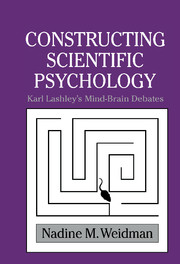Book contents
- Frontmatter
- Contents
- Preface
- Acknowledgments
- List of abbreviations
- Introduction
- 1 Lashley and Jennings: The origins of a hereditarian
- 2 Lashley, Watson, and the meaning of behaviorism
- 3 The pursuit of a neutral science
- 4 Neuropsychology and hereditarianism
- 5 Psychobiology and Progressivism
- 6 Psychobiology and its discontents: The Lashley-Herrick debate
- 7 Hull and psychology as a social science
- 8 Intelligence testing and thinking machines: The Lashley-Hull debate
- 9 Pure psychology
- 10 Public science and private life
- 11 Genetics, race biology, and depoliticization
- Epilogue: Lashley and American neuropsychology
- Appendix: Archives holding Lashley material
- Bibliography
- Index
4 - Neuropsychology and hereditarianism
Published online by Cambridge University Press: 16 September 2009
- Frontmatter
- Contents
- Preface
- Acknowledgments
- List of abbreviations
- Introduction
- 1 Lashley and Jennings: The origins of a hereditarian
- 2 Lashley, Watson, and the meaning of behaviorism
- 3 The pursuit of a neutral science
- 4 Neuropsychology and hereditarianism
- 5 Psychobiology and Progressivism
- 6 Psychobiology and its discontents: The Lashley-Herrick debate
- 7 Hull and psychology as a social science
- 8 Intelligence testing and thinking machines: The Lashley-Hull debate
- 9 Pure psychology
- 10 Public science and private life
- 11 Genetics, race biology, and depoliticization
- Epilogue: Lashley and American neuropsychology
- Appendix: Archives holding Lashley material
- Bibliography
- Index
Summary
An attempt to relate phylogenetic and individual differences in behavior to brain structure is therefore rather an adventure in correlating the mysterious with the unknown.
Karl LashleyThe Biological Approach to Psychology
Lashley's rejection of behaviorism involved not only a disavowal of the reflex theory, but also an equally strong denial of the importance of environmental influences on behavior. The anti-environmentalist emphasis of his argument is especially clear in his exchange of views with Walter S. Hunter in the Journal of General Psychology.
In 1930, Hunter published a criticism of Lashley's concept of cerebral equipotentiality, in which he claimed that Lashley's data did not demand a new theory of neural activity but rather conformed to the reflex arc theory. The central issue was whether behavior was peripherally or centrally controlled; with the behaviorists, Hunter argued that environmental stimuli, acting through the senses, determined behavior, while Lashley claimed that the central nervous system acted independently of the environment. Citing a great deal of evidence to prove that sensory stimulation controlled the various habits that Lashley's rats displayed, Hunter wrote:
[T]he results show that we are not justified in concluding, as Lashley does, that the maze habit [for example] is not controlled by any stimuli but by a central neural engram which unwinds, the figure of speech is mine, like some Victrola record when the rat is placed in the maze.
- Type
- Chapter
- Information
- Constructing Scientific PsychologyKarl Lashley's Mind-Brain Debates, pp. 71 - 85Publisher: Cambridge University PressPrint publication year: 1999



